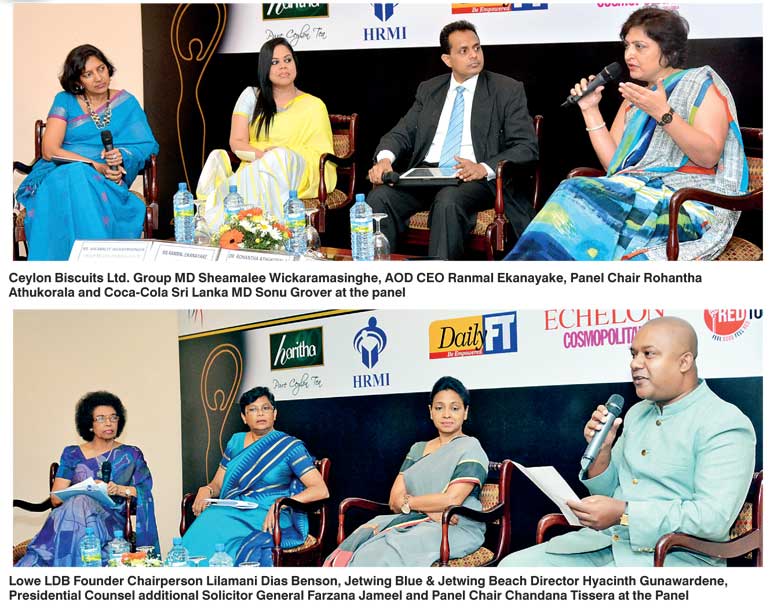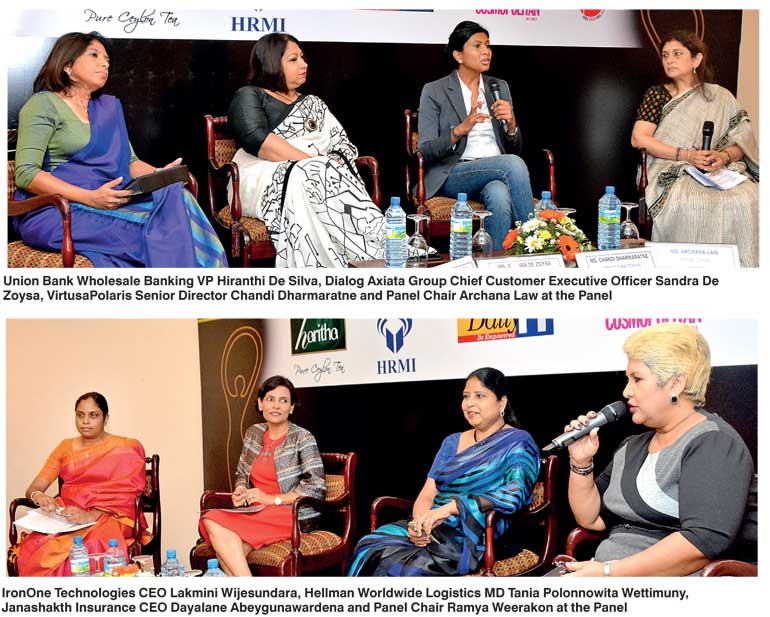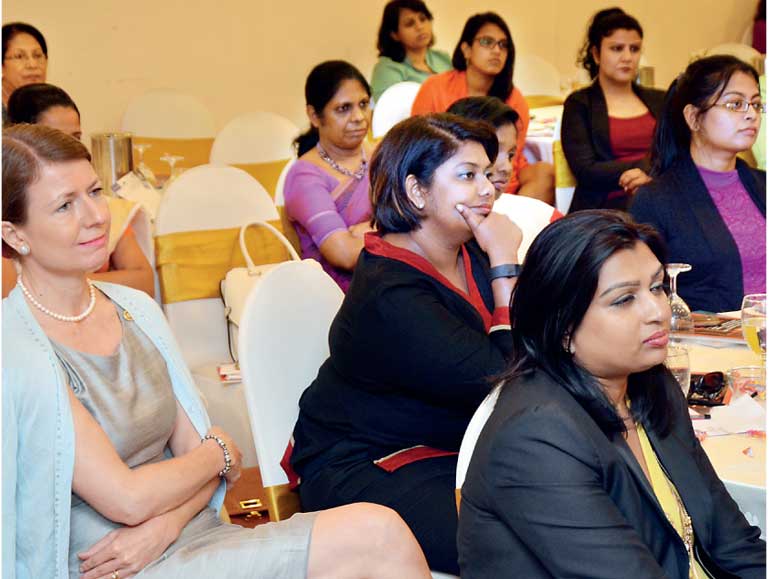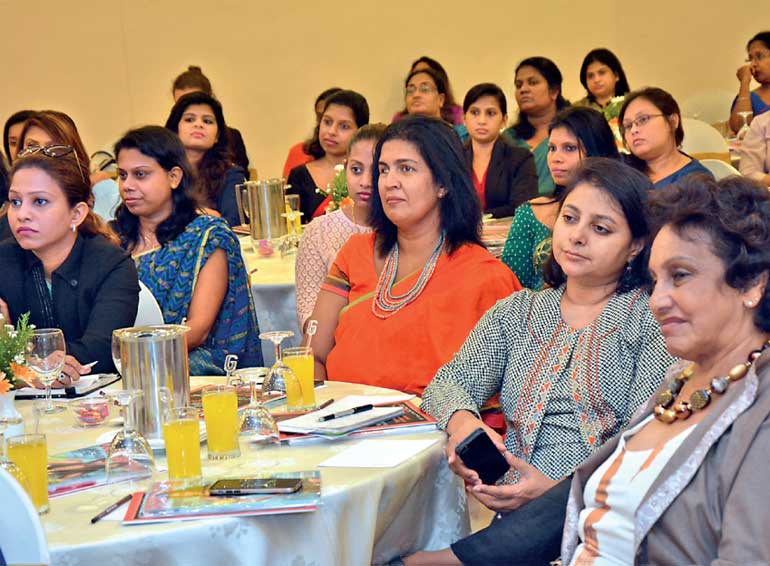Wednesday Feb 18, 2026
Wednesday Feb 18, 2026
Tuesday, 20 September 2016 00:01 - - {{hitsCtrl.values.hits}}
By Hiruni Dabarera
Inspired by a Silicon Article Valley that stated failing forward meant stepping forward from a failure with a lesson to be learnt, Women in Management (WIM) Director Sulochana Segera organised a women leaders’ forum at Galadari recently, under the theme ‘Failing Forward-Voice of Honorees’.
Through the forum Segera hoped to address the myth among Sri Lankan women that taking up a professional role would lead to the neglect of their children and families. She stressed on how educated and professionally competent women are held back from leadership roles owing to their moral responsibilities of looking after their families. Segera spoke on how society sees a woman as a successful human being. Hence, failure in her domestic role, or even her professional role would mean the end of her career.
The panellists present were the cream of Sri Lankan women in leadership roles during the year 2016. They spoke on how failure helped them become successful and climb up the corporate ladder.
The first session was a CEO Forum held under the theme ‘What it takes to be a great leader’. Rohantha Athukorala moderated the session. The panellists were Ceylon Biscuits Ltd. Group MD Sheamalee Wickaramasinghe, AOD CEO Ranmal Ekanayake and Coca-Cola Sri Lanka MD Sonu Grover. The session kicked off by each panellist giving a brief description on what inspires them daily to be successful and also what failure meant to them.
Sonu Grover: “I never looked upon any event, which did not turn out the way I expected as a failure because I always looked at them as a learning experience. It helped me come out as a better, more evolved human being. My favourite motto in life is ‘It’s not what you have, it’s what you do with what you have’. I feel it is very important to enjoy what you do and to take risks.”
Ranmal Ekanayake: “I grew up in a very simple family with my father as a role model. He always encouraged me to reach the top no matter what and never let the fact that I was a woman cloud my dreams. I was fortunate to have mentors who pushed me to reach success even when I felt reluctant. At AOD we have a very ‘straight jacket’ approach owing to two groups of people working under us: the creative group and the corporate support staff. Both should be approached differently depending on the situation. I am a firmly believer of teamwork.”
Sheamalee Wickramasinghe: “I never considered myself as a leader. In school I was a pretty average kid with mediocre grades. However, during the latter part of undergraduate studies I began to take my studies seriously and apply myself to the work due. I ended up getting a PHD. I think your success is all about believing in yourself. One thing I won’t compromise is what I am about and what I believe in. Be true to yourself.”
The first question was directed at Grover.

Grover: Today, Coca Cola operates in 207 countries and the beauty is we have never considered ourselves as a multinational company. We have been in the country for over six decades. At the end of the day it’s all about what the consumer desires. So we have both international and local brands in our portfolio. The challenges may be different across boundaries but the core issue or leadership is about getting the team together for a common vision and dragging them towards a common course. I have moved across different industries and geographies, but the issue of leadership at its core remains the same.
Grover: We can look at two different aspects here. One is the cultural aspect where as you move different geographies. Once I asked while having a global community discussion, ‘What is it about Australia? Why is it that so many Sri Lankans want to migrate there?’. The answer was Australia is what comes closest to the lifestyle they have in Sri Lanka where they see not just career growth, in terms of employment opportunities but also the work-life balance because Sri Lankans like to both work and enjoy life with their families. The other aspect is that there are companies which are family-owned and not. Family-owned companies have moved onto professionalise their management. So the family owner might not be running the company at all or could be running it in a very professional way. So I think it’s a question of what the company is. However, I believe that this is common in any country and not in Sri Lanka.
Sheamalee Wickramasinghe also added her thoughts regarding the discussion.
Wickramasinghe: Ceylon Biscuits Lt. is 48 years old and is a family business. We have two distinct types of employees. One is those who have been with has for over three decades and the other is the younger group of employees (between 25-35). The older group of employees are very aligned to the family and even want to see our presence at the factory quite often. But, the younger group is more focused on how this job is going to improve my future. I might come as one who is cleaning factory, but what is the role I’m going to play 10 years later. There is a huge change, challenge for employers, as we have to look into the welfare of both these types of employees, as we do not want huge turnover in staff.
Wickramasinghe: The world is a lot more competitive today, and if you do not do something new everyday somebody else will. So being updated is actually key to success. Today the way we market things has really evolved. It has also become essential to market in social media platforms that are frequented by youth now. I have subscribed to a lot of e-magazines and I travel a lot. I am a firm believer of learning everyday. I also learn by talking to people in business. My 15 year old son who challenges me everyday and looks at things in a very different way is a constant source of learning to me.
Grover: ‘If you want to double your earning, triple your earning’. I read vociferously. I attend a lot of conferences, workshops and take part in training. I think the key is as you move up in life the way you are aware of yourself and areas that you need help and what other people can bring to you to develop yourself. I’m also a firm believer of networking. Networking is working. You have to invest time in people. Invest heavily in self-awareness and secondly networking to stay relevant.
Ekanayake: When it comes to design it is crucial to stay updated. I watch a lot of videos and read magazines. Networking is also quite important through which I meet my mentors and ex-bosses and learn a lot from. Also we have to keep innovating daily.
Grover: Cultural coefficient. Today, leadership has taken a different dimension altogether. There are different nationalities working together today. It is necessary to have a global mind set and understand different cultural nuances.
Wickramasinghe: Being relevant and adaptability.
Ekanayake: Being genuine and a team player.
The second session moderated by Archana Law was conducted under the theme ‘You don’t have to fill anyone’s shoes but your own-let your potentials shine’. VirtusaPolaris Senior Director Chandi Dharmaratne, Union Bank Wholesale Banking VP Hiranthi De Silva and Dialog Axiata Group Chief Customer Executive Officer Sandra De Zoysa were the panellists present.
Dharmaratne: “I will start off with a book I read recently written by Debora L. Spar; ‘Wonder Women-Quest for perfection’. It explains how as a woman you constantly try to achieve perfection in every role you play: wife, mother or a corporate woman. I believe that this quest for perfection persists as it is always expected from women by the society. I have seldom come across men in corporate roles that have been posed the question ‘how do you balance work life?’ But this is always asked from a woman with kids and also working. Immediately, a woman is faced with guilt as she tries to sound as perfect as possible in both roles she is supposed to play. In this book it talks about how in order to be successful you have to trade off certain things in certain roles you play, and it’s alright to not to be perfect. You should decide and design the trade-off and success in every role you play. If one constantly tries to achieve this unachievable notion of perfection, it will only limit herself and prevented from reaching her own potential. I think it is important to have your own vision and definition of success. It is not always about your professional role. An empowered woman could be a woman at home looking after her children if that is what you want to be and that is what success means to you. Whatever role you play you need to have focus, commitment, dedication, hard work and the confidence in your own competence. There will be times you fail but it is fine as long as you stand up, reflect and move on in life.”
De Zoysa: “My philosophy in life is no matter what you do; you need to have fun in life. For me, fun goes with being passionate. I am somebody passionate about people and I believe it is my strength. My definition for quest of perfection is more about excellence. I am someone in search of excellence and daily little steps. Competition is good, but it is always about competing with yourself; better yourself than you were yesterday. Each of us has expectations. As we move on in life these expectations put pressure on us. It is important to know what is possible and not. Sometimes you may have to disappoint someone, compromise along the way but be committed to what you do and do not let yourself down.”
De Silva: “I want to share with you my progression in my profession; how starting from the lowermost position in the banking sector I reached the position I am at today. Initially, it was all about caring, using the right words at the right time, and being empathetic. Then it became all about taking challenges. The biggest risk I took in my professional life was when I had to shift from country’s third largest bank where I had served over 25 years to a bank which is relatively small, still in the development stages. But, I had confidence in myself that I could take the challenge and I had the potential to deliver. Also when you are in the same old place for long people tend to think of you as part of the institution. Couple of year’s back I took up photography as a hobby and even organised an exhibition which I was appreciated for and gave me a lot of joy. In addition to being a professional I take time out to pursue what I love. I also think my ability to switch on and switch off helped me to manage both my professional and personal lives.”

De Silva: Especially in the banking industry there is a skills mismatch. I have interviewed candidates with a bachelor in agriculture, biotechnology-in general not relevant for banking coming in search of a banking job. Banking for women has become a preferred profession for women. I feel that our education system does not align with the job opportunities available.
Dharmaratne: I think in the IT industry, from an entry-level perspective, skills mismatch is predominant. It is heavily felt in terms of employability skills. We have graduates with either an IT degree or an engineering degree joining us. In our universities there is a GPA to measure the level of technical skills in students but what we lack is a GPA for adaptability skills, learning and unlearning skills, communication skills etc. I think that gap is mainly from employability perspectives that help you climb up the professional ladder and become successful leaders. Sometimes we find recruits who do not have the highest GPA with suitable professional skills for the job. They will reach the top faster than the others.
De Zoysa: I have worked with a lot of young people-school leavers. In my own experience, we recruit from the potential we see in candidates from skills like empathy, being a team player, commitment and passion. This is generally for the service sector. It is true we have been unable to find the ideal perfect candidate for a vacant job, but I want to look around and ask ‘were you the ideal perfect person for the job you first interviewed?’ It is what you become with the help of others.
The third session was conducted under the theme ‘Everyday Leadership – Neither the position, nor the field, the personality matters’. Chandana Dissera moderated it. The panellists present were Lowe LDB Founder Chairperson Lilamani Dias Benson, Presidential Counsel additional Solicitor General Farzana Jameel and Jetwing Blue/Jetwing Beach Director Hyacinth Gunawardene.
Benson: I firmly believe the secret to success is to finding what you love to do and make a career out of it. I love advertising. So I came to work with passion and enthusiasm everyday. Brainstorming is one of the few techniques we use at our firm; professionally structured brainstorms. We are in the ideas business and we must go after intrusive ideas that might tempt a customer to buy the brand we are promoting in order to be successful; ideas that linger longer after the image is out of sight. The best ideas are about life, freedom, quality of time, self esteem. We also use several workshops to fire up imagination.
Gunawardene: I am coming from a male-dominated industry. There are only three general managers in the hospitality industry. I started my career just after school. From the time I was young I had a passion for people. I was always looking for something I can do for people. Hence, my passion and commitment brought me to the hospitality industry. Hospitality industry is a very challenging industry as a crisis anywhere in the world can affect it. As a female what I can tell is despite challenges you need to be calm and pursue your journey towards achieving your vision. It is very important to be emotionally well balanced. You need to have the hard glove in one hand and the soft glove in the other hand as use them appropriately.
Jameel: I am in a very hard-core male-dominated field. When I joined the attorney General’s department I was number seven in a list of 150 members. Being a female in the field of practising law in court as opposed to in a bank or company is very different. One of the mottos I have constantly stood by is ‘don’t take yourself too seriously, take your work seriously then everything else will fall into place’. This was what inspired my personality. When focusing on this motto I had never had time to think about where I would end up 10 or 20 years later. I yet do not know what I want to do in the end of my career. However, whenever I was handed a case: small or big, I took every file seriously and performed my task to the fullest to ensure justice was done. I believe this is what shaped me today. As a result of being completely engaged in what I did I was successful. In the government sector we do not have the space for networking or developing other skills, but doing what we are given. Hopefully, it will impact on people in some meaningful way and that will eventually shape what you become. One of the rules I live by is God consciousness; integrity. You do the right thing even when somebody else is not watching.
Gunawardene: Actually physical traits and mental have to be equally balanced. We always need to plan ahead. As a leader you need to be able to steer your group towards success even when your plans don’t work. In the mornings I usually do a lot of mediation to balance myself. I get my team to work with me closely, respect their ideas and support them during difficulties. You have to always balance yourself and keep in mind that you are the support system of your team as their leader.
Jameel: When I have professional challenges there will always be somebody dissatisfied. Therefore, you need to step away and look at the core issue. This does not mean you need not be empathetic. But when deciding on a crucial legal issue I always seek the legal structure so that I am borne off the guilty for I know I am backed by concrete facts.
The audience directed a question at Hyacinth Gunawardene

Gunawardene: In Sri Lanka a lot of women are not willing to work long hours. It is a 24-hour job. It is also peer pressure and most women do not like returning home late after work. At Jetwing we find it difficult to retain the three female employees we have. I think it is also the culture of Sri Lanka that does not promote the image of a woman working at a hotel. I need to ensure that this image is only a conceived notion for there is nothing to fear. We even provide transport to employees and we maintain a strict code of discipline in our organisations.
Panellists who were awarded at this year’s Professional and Career Women’s Awards held the final session of the forum under the theme ‘The uniqueness of women leadership’. They were IronOne Technologies CEO Lakmini Wijesundara, Janashakth Insurance CEO Dayalane Abeygunawardena and Hellman Worldwide Logistics MD Tania Polonnowita Wettimuny. Ramya Weerakon moderated the session.
Abeygunawardene: Currently, I am reading for business psychology where the theme for my final thesis is why women are not taking up more professional roles in the society. This subject is very close to my heart. I see success as an iceberg. We do not know how much successful people have gone through to reach where they are in life. I believe in determination, persuasion, and persistent curiosity in addition to continuous learning. Networking is also crucial to success. One must always challenge oneself. Go ahead and do the things you think you cannot. ‘We all have magic inside us’. We never realise it. I believed in that and wanted to work towards that. This brought me to where I am today. Also learn from people around you but be yourself. Have those unique styles that help you achieve who you want to be.
Wettimuny: Born in Kurunegala and bred in Kandy at first I found it very hard when I came to highly commercialised city of Colombo for my job. I came as intern and had a choice between freight forwarding, tourism and transportation. I had to work with a lot of men, as my industry is also male dominated. But, I think similar to us men also face their fair share of discriminations, pressures and hard work. I don’t think problems are gender specific. I never compared myself and bring gender into what I did. I never felt I was a female sitting amidst many men, and was aware of the glass ceiling. I felt men also experienced the same challenges I did. My male-co workers also supported me throughout my professional career.
Wijesundara:I think we should never set a benchmark to ourselves. In a Forbes article it said, ‘what do successful women have in common? They don’t let the persistent underrepresentation of women in business deter them form taking a place at the table’. Generations of women before us never thought of taking up professional roles. It just happened that over time women stayed back. But today we see this diminishing little by little as women face fewer barriers when taking up professional roles than before. If you want something really badly I think you need to go out there and get it. I f women are consciously getting into business numbers will increase in future. In Singapore one of our partners’ group CEO is a female and so is so many other employees. So I think even globally the situation is quite changing.
The first question of the session was directed at Dayalane Abeygunawardene.
Abeygunawardene: My simple answer is time management. I am an early bird. In the morning I keep one hour to myself where I meditate by myself and think on my own. Whenever I put down an event on my diary I never shift it or postpone it. I usually travel to funerals in the night to manage the time and also as it is important to keep up my social relations.
The final question was posed to Tania Wettimuny.
Wettimuny: In the past years this sector was male dominated but things are changing now. Even in Sri Lanka many females are now heading senior positions in the Logistics Industry. It is relatively slow but we are encouraging it. It is challenging but business today is very challenging. In like any other industry you need to be committed, believe in yourself and work towards your career goal.
